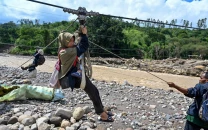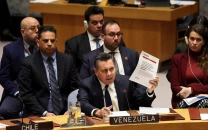Australia reviews 66 military export permits to Israel: Report
Permits are being assessed to ensure compliance with Australia’s human rights, international commitments
1729413420-0/BeFunk_§-(39)1729413420-0-640x480.webp)
Australia has initiated a review of 66 military export permits to Israel, approved before the Gaza war, according to reports from The Guardian.
The permits, overseen by the Department of Defense, are being assessed on a case-by-case basis to ensure compliance with Australia’s international commitments, particularly concerning human rights.
This scrutiny follows pressure from advocacy groups, including the Australian Centre for International Justice, which in April called for the cancellation of permits that could facilitate military actions by Israel.
Since the conflict in Gaza escalated, Canberra has maintained its position of not supplying weapons or ammunition to Israel, a stance reiterated by the federal government.
Nonetheless, Australia faces criticism for lacking transparency regarding the exact nature of the permits and what they encompass.
Defense officials have confirmed that permits are required for various items, including IT equipment, software, radios, and electronic components, many of which have commercial and civilian uses.
Australia is also involved in the global supply chain for the F-35 fighter aircraft, which Israel has utilized during its operations in Gaza.
This review mirrors similar actions taken by the UK government, which recently suspended 30 of its arms export licenses to Israel over concerns they could be used in violation of international humanitarian law.
While Australia has not revoked any permits yet, decisions are expected to be finalized after the review process concludes in the coming months.
The move comes as Israel's military continues its invasion in Gaza.
Since the start of the conflict in October 2023, over 42,000 Palestinians have been killed, according to Gaza's Government Media Office.
Israeli forces have conducted heavy bombings across Gaza, reducing parts of the territory to rubble.
Additionally, Israeli invasions have expanded into Lebanon, including two raids on the capital, Beirut, further escalating the situation.
In Gaza, at least 73 people were killed in an attack on Beit Lahiya, and many remain trapped under the rubble.
Ongoing Israeli invasions have also targeted critical infrastructure, with four water engineers killed while attempting to repair damage near Khan Younis.
Amid calls for a ceasefire and international efforts to address the humanitarian crisis, the Australian government continues to evaluate its role in the conflict, including how military exports fit within its broader foreign policy and human rights obligations.
Critics, including the Australian Greens, have demanded a complete end to military trade with Israel.
However, Prime Minister Anthony Albanese’s government has defended its current position, emphasizing the importance of its contracts with Israeli companies that supply goods to the Australian Defence Force and police.
As the situation in Gaza intensifies, calls for transparency and a full arms embargo grow louder, with advocacy groups urging Australia to align its policies with international law and humanitarian considerations.


















COMMENTS
Comments are moderated and generally will be posted if they are on-topic and not abusive.
For more information, please see our Comments FAQ